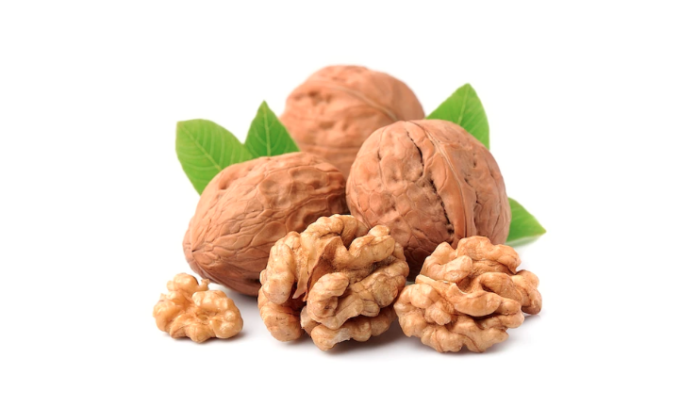Walnuts can be used in a variety of recipes, from sweet baked products to savoury dishes, as a substantial, satisfying snack and addition. Walnuts are a fantastic source of polyunsaturated fats, a beneficial type of fat that can increase coronary heart health among other benefits. Although there are several diverse varieties of walnuts, English walnuts are the most prevalent.
The USDA has provided the following vitamin data for 1 ounce (28g), or roughly seven whole English walnuts or fourteen halves.
Carbs
The most conveniently contains roughly 3.8 grammes of carbs per serving of walnuts. Starch (0.017g) and sugar (0.012g) make up a very minor portion of that total (0.7g). Healthy fibre makes up the majority of the carbohydrate in walnuts (1.9g).
Walnuts have a predicted glycemic index of 15, making them a low-glycemic food. An unmarried serving of walnuts is thought to have a glycemic load of 1. Glycemic load takes into account portion size when estimating how a meal may affect blood sugar levels.
Fats Make up the majority of the calories in walnuts. When you eat one serving of nuts, you’ll consume 18 grammes of fat. The majority of the fats (13.4g) are polyunsaturated fats, although there are also a few monounsaturated fats (2.5g) and almost no saturated fats (1.7g).
Both monounsaturated and polyunsaturated fats are regarded as healthy fats. Typically, they derive their energy from plant sources like nuts, seeds, and avocados. It has long been established through research that replacing saturated fat with polyunsaturated or monounsaturated fats lowers your risk of developing cardiovascular disease.
Walnuts not only give fibre and healthful fat, but also a protein that helps the body function better. A single serving provides more than 4 grammes.
Minerals and vitamins
Walnuts provide half of your daily needs and are a great source of manganese and copper. They are a great source of magnesium and phosphorus as well. Smaller amounts of iron, calcium, zinc, potassium, and Vidalista 20mg are also provided by the nuts.
Walnuts include vitamin B6, folate, and thiamin.
Health Advantages
There are several benefits of eating walnuts as part of a healthy weight loss regimen.
Consuming nuts has been demonstrated to reduce the risk of cardiovascular disease, according to published study.
When compared to a low-calorie weight loss strategy on my own, one can see that eating a calorie-restricted, walnut-enriched diet improved LDL cholesterol readings and systolic blood pressure. Additionally, numerous studies have linked consuming tree nuts, which include walnuts, to a lower risk of obesity, a smaller waistline, improved HDL (good) cholesterol, and a lower risk of cardiovascular disease.
Walnuts are frequently recommended by health specialists as part of a heart-healthy diet because they contain polyunsaturated oil, which has been shown to have positive effects on the heart.
Additionally, walnuts contain plant-based omega-3 alpha-linolenic acid (ALA). DHA and EPA, two long-chain omega-3 fatty acids, can be produced from ALA.
According to research, eating a diet high in omega-3 fatty acids may also lower the risk of cardiovascular disease and even benefit those with type 2 diabetes, especially those who have elevated triglycerides.
Aids Healthy Weight Loss and Weight Management
Preference for nuts has been linked to better weight management and lower body fat. Studies that were partially supported by the California Walnut Commission have even shown that eating mostly walnuts can help you maintain a healthy weight.
Additionally, nut consumption has been linked to lower body weight measurements, a reduced risk of metabolic syndrome, and weight issues, according to independent studies. However, the authors of a review of one study advised that more research is required to increase knowledge and pinpoint specific nuts’ health benefits.
Walnuts are a wise food choice for weight loss because they are a great source of protein and fibre. Protein and fibre might keep you fuller longer. Foods high in fibre can also help the body maintain a regular flow of glucose, preventing the majority of significant blood sugar increases. According to studies, eating foods high in fibre can help overweight or obese people reach and maintain a healthy weight.
The secret to successfully incorporating healthy fats like nuts into your weight reduction regimen is to precisely monitor your component.Despite having few carbs, nuts can have many calories in a tiny meal. Even eating wholesome meals in excess can result in weight gain.
Enhances Mental Health
According to a study that was written up in the Journal of Nutrition, eating walnuts can help keep the brain healthy as we age. According to the study’s authors, adopting a healthy diet high in antioxidants and anti-inflammatory phytochemicals can help avoid many neurodegenerative illnesses early in life.
Walnuts are known to contain the best antioxidant concentration of any commonly ingested nut, as well as the highest total phenolic and flavonoid contents. One of the simplest ways to reduce the risk of age-related cognitive impairment, according to the study’s authors, is to consume a weight-loss diet high in walnuts (along with other antioxidant foods).
Reduces Prostate Cancer Risk
One linked article includes studies showing that individuals at risk for prostate cancer who consume 75 grammes of walnuts per day advance vascular and prostate biomarkers. The high tocopherol content of the food was highlighted by the study’s authors as possibly contributing to this gain.
Another study suggested that men who consumed 35 grammes of walnuts per day might have a lower risk of developing prostate cancer. minimises inflammation
According to other studies, walnuts’ nutritional components can help prevent infections, which reduces the risk of developing cancer. The author also points out that there is a dearth of human clinical evidence supporting the association between walnuts and the primary outcome of cancer risk.
Allergies to tree nuts are not unusual. Tree nuts include things like cashews, almonds, and walnuts. In addition to these signs and symptoms, a tree nut allergy may also cause stomach pain, cramps, nausea and vomiting, diarrhoea, difficulty swallowing, nasal congestion or a runny nose, and itching of the mouth, throat, eyes, or skin, according to the American College of Allergy, Asthma, and Immunology (ACAAI).
When consuming tree nuts, those who are hypersensitive to them may also suffer from severe reactions like anaphylaxis or breathing difficulties. Anaphylaxis is a potentially life-threatening reaction that can cause breathing problems and throw your body for a loop.
Walnuts must be avoided if you are allergic to any other tree nut or possibly peanuts (which are technically a legume). Before consuming walnuts, see your healthcare professional to receive tailored suggestions.
Varieties
English walnuts are the most widely available variety of walnut, however Persian walnuts and black walnuts can also be found in some areas.
English walnuts are mostly grown in Turkey, Iran, China, and the United States. Ninety-nine percent of the English walnuts consumed are grown in California. Fildena is the amazing medicine which treats men’s relationship issue very easily.
But everyone has the same distinctive brown oval shell and light brown kernel.
For cooking or incorporating tiny amounts into salads, yoghurt, or dishes, unshelled walnuts work best. Unshelled walnuts are probably excellent if you want to eat them. You can estimate how much you are consuming by cracking open the shell and throwing away the nut.
Last but not least, you can find both roasted and raw walnuts at your local grocery store. The nutritional makeup of a nut is no longer altered by roasting. However, on general, roasted nuts probably contain more fat and calories than raw nuts because of this. Even the dietary profile can be changed by other additives (such salt or honey).

